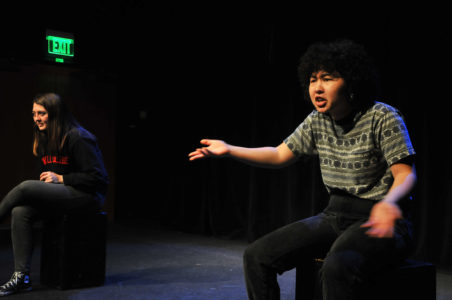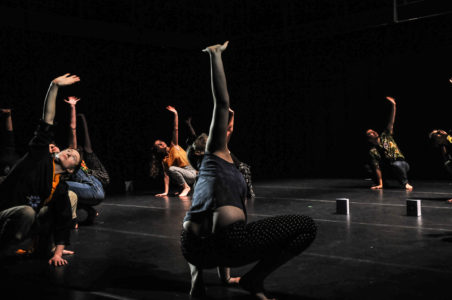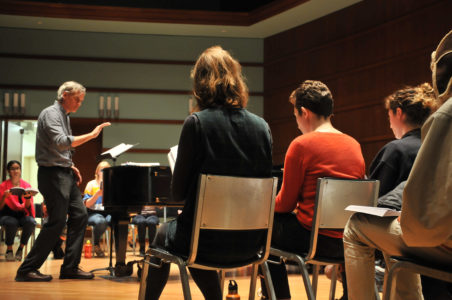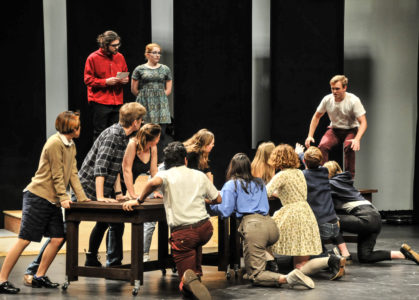Student Directed One Acts Festival
The twelve students in Professor Craig Quintero’s directing class will present their one act plays during the One Acts Festival this weekend. The festival spans from Friday to Sunday, with each play performed twice over the course of the weekend. Tickets for the event sold out within two hours of becoming available at the box office.
Each student directed a play of their choosing over the course of the semester, applying what they discussed in class to their own directing process. Students researched and read several one-act plays before each choosing one that fit their personal interests as a director. The only requirements for their selections were that the play could be no longer than 20 minutes, with a cast of no more than four.
Following the one-act selections, the class held auditions over two days and assigned actors to each director. The students then held rehearsals for six to eight hours each week, outside of class time.
“It was a lot of pressure, but then once the rehearsal process actually started, I found it to be a lot of fun to play with my actors, to help them develop their characters and figure that out together,” said Nicole Rosengurt ‘20.
Quintero came to rehearsals about once each week to give directors notes, but the otherwise left the directing process entirely up to the students. During class meetings, students gave each other feedback and brainstormed ideas for their individual plays.
“My favorite part of directing has been seeing this vision come together with all of these different elements. It’s so incredible seeing what just started off as a vague idea in my head, like some words on a page and ‘maybe this will look like that,’ and then all of it actually coming together as fifteen minutes of art is so exciting,” said Conner Stanfield ’21.
In addition to directing, the students were in charge of technical details including set and light design as well as working with costume designers.
“I’ve done a lot of theater work before, but I’ve mostly done behind the scenes design stuff. This is my first time ever directing, and I knew it was going to be difficult, but I didn’t know it was going to be this difficult,” said Carlos Ventura ’20.
This weekend the students will debut their one-acts to what they anticipate will be a full house.
“Putting on a piece is always something that you put a lot of emotion into, and it’s a part of you that you’re putting out there for people to see. Even if you’re a first-time director, [or] if you’ve done this many times before, I think it’s always very nerve racking to put something on,” Ventura said.
Despite the nerves, the student-directors are excited to finally debut the plays on which they have worked so meticulously over the course of this semester.
“This certain magic that just can’t happen during rehearsals happens during a show night, so I’m really excited for that energy and for these things to reach their final form,” Rosengurt said.

Dance Ensemble: ACORN
By Lily Seibert
seibertl@grinnell.edu
On Dec. 7 and 8, the Grinnell College Dance Ensemble will hold their end-of-semester performance at 7 p.m. in the Flanagan Theater. While the show explores multiple themes, its main inspiration is Yoko Ono’s “Acorn,” a book of 100 short poems, that the dancers have adapted into their performance. Professor Celeste Miller, theater and dance, will direct the show.
The dancers chose nine of the instructions to use as source material, seamlessly weaving the words into their movements to create a narrative. Ono’s book itself emerges as a prop at several points throughout the performance. Audience members can expect to witness a variety of timely themes conveyed through both the dancers’ movements and Ono’s poetry.
Miller frequently imbues her work with social consciousness— last semester’s show, strangers in a strange land, focused on belonging, citizenship and borders. This year’s subject matter includes a mixture of joy and suffering.
“We’ve sort of created a world that we want to invite the audience into,” said Kaya Prasad ’19. “And it’s a world that has sadness and famine, but it’s also a world that has a lot of joy and…gratefulness. But it’s not about escapism. It’s about living in a world where there is darkness but being able to find the hope and joy even inside of that.”
Miller said her desire for her students to “find a balance between joy and all the other emotions. The sorrow, the fear, and all those things.”
In addition to creating performances with a specific message, Miller said she strives to choreograph dances that touch on the unique strengths of each student. This strategy manifests itself in the show, which often features individuals breaking off from the group and carving out their own space onstage.
“In terms of style, it’s always whoever comes to ensemble, we work together to build ourselves as expressive movers,” said Miller. “So that means that it’s this beautiful melding of each individual who comes into the group. It never looks the same.”
While Miller determines the underlying theme of each piece, the dancers have had extensive opportunity for creative expression during the process of creating and rehearsing the piece.
“This ensemble year has been particularly playful, whimsical,” said Naomi Worob ’19. “Usually [the dance studio] is more of what I think of as a laboratory or a space for me to individually explore movement, but this semester it’s been all about connecting with each other and playing with each other, being goofy, being there for each other.”
The process of experimentation that Miller encourages has been at once intimidating and liberating for the students.
“Coming from a rigid ballet background, watching what dance ensemble does is very different, but I find it super wholesome,” said Christina Collins ’21. “I remember more in my ballet days, the most exploration I got was going across the floor with a certain combination that was handed to me. So it was a big learning curve, coming here and having [Miller] be like, ‘Go!’”
Despite each individual’s unique style, the performers have created a cohesive team throughout the semester. The dancers said they feel encouraged to express their vulnerability and experiment with their movements onstage without fear of judgment.
“I feel like the hope is that we’re all comfortable in our bodies enough that we can feel free to express ourselves in whatever ways and know that that will be supported by the group, which feels radically different than a lot of other places,” Worob said.

Considering Matthew Shepard
By Sarah Licht
lichtsar@grinnell.edu
Grinnell Singers’ Sunday performance of “Considering Matthew Shepard” by Craig Hella Johnson will offer an opportunity for peace and remembrance through the exploration of a horrific story of hatred and violence.
The piece revolves around the heinous 1998 murder of Matthew Shepard. Professor John Rommereim, music, who is the director of the Grinnell Singers and conductor of the piece, describes “Considering Matthew Shepard” as a “musical theatre/choral piece” because it flows through the story of Shephard’s life and death while still being based in song.
Despite the graphic events that surround the choral piece, Rommereim said, “it’s not like a documentary where you are left to sit with the emotions” but is instead an experience of hope and healing. He expressed hope that, given the state of the country in present day, the piece will allow all of us to “process the terrible news” in the world and to “come together in some pathway toward healing.”
Rommereim explained that he discovered Considering Matthew Shepard when he had “met someone in 2017 who was writing his dissertation on [the piece]” and he [Rommereim] thought it was “remarkable.”
Since the piece was yet to be officially published, Rommereim was only able to acquire the musical scores a month into the school year. Despite the time delays, however, Rommereim saw how well singers were able to connect to the piece. “You could see it from the first time [the students] saw the piece how greatly it affected them,” said Rommereim.
For the students involved in the production of Considering Matthew Shepard, the process of studying the piece impacted them profoundly. “Learning the music was really overwhelming because of what the piece is about,” said Conner Stanfield ’21.
One of the songs rehearsed, Stanfield said, was so powerful that “the first time we performed it, I couldn’t even get any notes out because I was just so overwhelmed with emotion.”
Stanfield emphasized the importance of performing the piece due to the national and international cultural impact of the murder of Matthew Shepard. He explained that the murder drew attention to the oppression that queer people face on a daily basis. Shepard’s death led to the passage of the Matthew Shepard and James Byrd Jr. Hate Crimes Prevention Act in 2009, which expanded the previous federal definition of a hate crime.
“The piece really asks important questions, such as how do we all contribute to this culture where violence against people who aren’t like us is normalized? And, how do we recover from violence, and how do we continue to live in spite of that fear and embrace the beauty of the world around us?” Stanfield said.
The Grinnell Singers and the Oratorio Society will perform “Considering Matthew Shepard” at 2 PM in Sebring-Lewis Hall in the Bucksbaum Center for the Arts this Sunday, Dec. 9th.
The performance will be free and open to the public, and donations will be collected for the Matthew Shepard Scholarship Program, an Iowa-based program that gives scholarships to students who have demonstrated outstanding academic performance and contribution to the LGBTQ+ community.
Editor’s note: Eva Hill ‘22 is a copy editor for The S&B and is a member of Grinnell Singers.

Spring Awakening MAP Production
By Will Dubow
dubowwil@grinnell.edu
How do you produce musical theater at a school that has no classes in musical theater? You do it yourself.
An entirely student-run production of “Spring Awakening,” a musical based on Frank Wiedekin’s nineteenth century play about German youth in the 1890s, will come to the Roberts Theater next week. The play, according to director Nolan Boggess ’19, theater and dance major, is about teenagers “discovering their bodies, and their sexual and social selves, in the oppressed environment of Germany at that time.”
The 2006 musical adaptation matches Wiedekin’s script with what Boggess describes as “old-timey language” with rock, folk, techno and pop music to transform the play into a modernized juxtaposition of the traditional and the contemporary.
When the original play came out, it was almost immediately banned for its scandalous and controversial material, but the 2006 musical went on Broadway and won multiple Tony awards. For Boggess, who considers himself obsessed with musical theatre, and especially “Spring Awakening,” it has been a childhood dream to direct this musical.
Boggess is no amateur when it comes to directing musical theater. He directed a production of the musical Godspell during his second year at the College and has continued to have a major role in the theatre department. Now as an older director, he feels confident in his guidance of the show and is excited for people to enjoy the musical. As a result of directing this show and Godspell, Boggess has discovered that directing is something he is seriously considering pursuing after graduation.
Abraham Teuber ’22, undeclared, is a first-year actor in “Spring Awakening.” Teuber plays the character of Moritz, who struggles with his sexuality and understanding his body.
Teuber is a self-proclaimed theater kid and a member of the Grinnell Singers. Though acting has been a big part of Teuber’s life since elementary school, he did not expect to land a lead role and auditioned “just for fun.” Teuber was shocked when he got called back and was ultimately chosen for the part. He reported initially feeling nervous under the pressure, but those feelings went away quickly as his fellow castmates, many of whom had participated in past student-run musical theater productions at the College, welcomed him.
“We all get along really well. One of my favorite parts about being in this production is getting to know these people and connecting with the second, third and fourth-years,” said Teuber.
He mentioned other first-year peers participating in the show and specifically lauded Kaitlin Ryan ’22, undeclared, another first-year, who “holds the show together” as a pianist and conductor for the band.
“Spring Awakening,” opens on Thursday, Dec. 13 and runs through the 16. Tickets are available on Monday Dec. 10 at the Box Office.
Content Warning: Spring Awakening is intended for mature audience and includes scenes depicting or concerning death (including suicide), sexual assault, physical and sexual abuse (child abuse, incest), and sexual situations (includes masturbation). Contact [boggessn] with any questions.
Editor’s note: Zoe Fruchter ‘21 is arts editor of The S&B and is involved in this production.























































